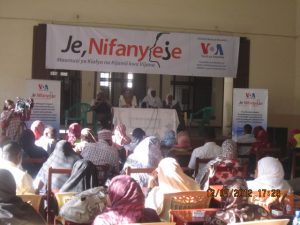Swahili Service Town Hall Meeting in Zanzibar – July 11-12, 2012
Swahili services concluded two more town hall meetings in July, part of a series of town hall meetings funded by USAID-Tanzania under the Tanzania Health Project. Swahili staffer Khadija Riyami moderated both town hall meetings. The first town hall meeting was held at Fumba, about 17 kilometers from Zanzibar town, and attended by nearly 100 villagers mostly women and girls. The topic was: Early Marriages and School drop-out. The village head (Sheha) Issa Shein Ameir urged the villagers to talk openly and freely about the problems facing girls in the area. Teenage pregnancies, early marriages emerged as issues of great concerns to the participants, saying those factors lead to high rates in school drop-outs.
Most of the girls in attendance complained that their voices are not heard and their role not recognized because of the marginalization of their gender. This sentiment was echoed by the village elders and teachers who said the village is facing a serious problem of teen pregnancies and school drop-outs, which has directly affected the education system and standard in the village. The villagers were very open in discussing the issues facing girls and youth in their area, and the concept of giving a girl a voice to make healthy decisions was well received by everyone. The meeting take-away for village elders, as they expressed it, is to make sure programs are put in place to empower young people in making good health and social decision. 
Zanzibar Town Hall Meeting, July 12
The Zanzibar town hall meeting was held on July 12 at Haile Sellassie Hall in Stone Town. About 130 people attended the meeting whose topic was: “Gender-based violence and their effects on the youth.” The Minister of Health, Juma Duni Haji, officially opened the meeting and embraced the Je Nifanyeje (What shall I do) concept by challenging activists, religious leaders, lawyers, teachers and other participants to assess themselves and put into use the “Je Nifanyeje” concept before making any decisions. Mr Duni said if the slogan is used effectively the end results will be very positive because no decision will be made without thorough scrutiny as to what will be the outcome of any decision that is to be made. 
Also in attendance were the directors of health services, gender and social welfare, youth, officials of the Zanzibar Women Lawyers Association, Association of the disabled girls, religious leader, various NGOs dealing with gender issues, school teachers, youths, activists and students.
Panelists were: Hamisa Mmanga- lawyer, Dr Issa Zidi – religious leader, Asha A.
Abdu – Social and Cultural Affairs Official, Zeudi Abdallah (19) youth, Mwanaidi Ali – women’s issues and Enock Peter – a health official from a local NGO.
The issue that emerged under the umbrella of GBV was the increase of rape incident not only against girls but boys too. Panelists said main violence facing girls in Zanzibar is rape which in recent months it has been on the rise. The young boys are also victims of rape violence in which the culprits are people they know. This problem has resulted in health problems among the victims (girls and boys) such as contracting hiv/aids, pregnancies and the worst is that the unexpected pregnancies lead to unsafe abortions. They noted that introduction of such concepts as Je Nifanyeje was necessary to empower young people with the mental toughness to make healthy decisions. Participants were very happy to learn that the VOA’s Je Nifanyeje radio show is being done by the youth for the youth. Minister Duni said once the youths hear their peers discussing their issues they feel that their problems are being recognized by others in the society.
but boys too. Panelists said main violence facing girls in Zanzibar is rape which in recent months it has been on the rise. The young boys are also victims of rape violence in which the culprits are people they know. This problem has resulted in health problems among the victims (girls and boys) such as contracting hiv/aids, pregnancies and the worst is that the unexpected pregnancies lead to unsafe abortions. They noted that introduction of such concepts as Je Nifanyeje was necessary to empower young people with the mental toughness to make healthy decisions. Participants were very happy to learn that the VOA’s Je Nifanyeje radio show is being done by the youth for the youth. Minister Duni said once the youths hear their peers discussing their issues they feel that their problems are being recognized by others in the society. 
Both meetings received good media coverage by the Zanzibar Broadcasting Corporation and Channel Ten of Tanzania mainland, and several FM stations as well as newspapers.

